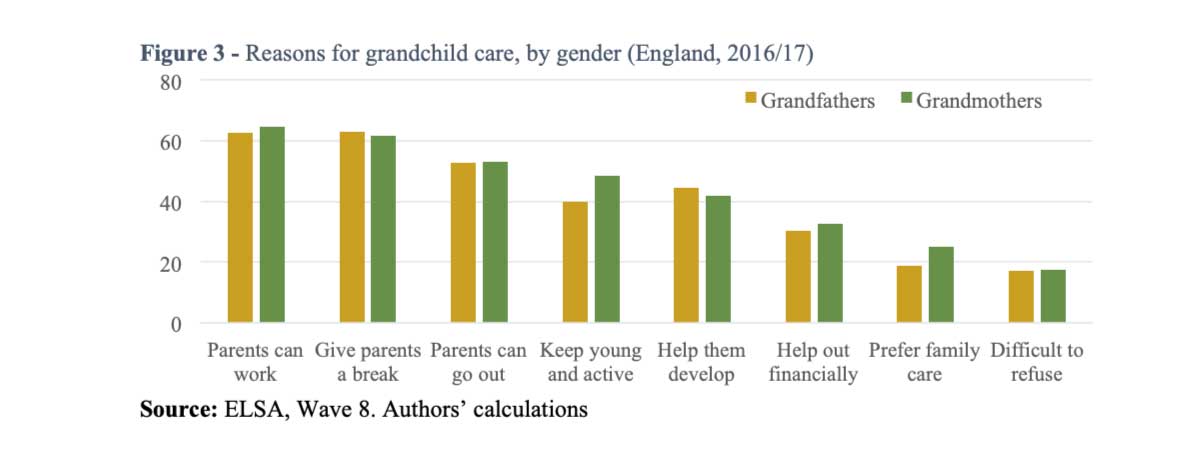Giorgio Di Gessa, Paola Zaninotto and Karen Glaser find that, in England, most grandmothers and grandfathers provide grandchild care throughout the year to allow parents to undertake paid work. However, grandchild care and helping activities fall unevenly on grandmothers.
In many countries around the globe, a large percentage of grandparents provide care to their grandchildren (Fuller-Thomson and Minkler 2001; Hank and Buber 2009; Horsfall and Dempsey 2015). However, less is known on when in the year the care takes place, what grandparents actually do when they look after grandchildren, and why they provide care. Moreover, evidence on whether grandmothers and grandfathers perform grandchild care differently and whether they have different motivations for supporting their grandchildren remains scarce (Hank et al. 2018).
In a recent publication (Di Gessa, Zaninotto and Glaser 2020) we used data from the English Longitudinal Study of Ageing (ELSA) (Banks et al. 2019) to describe the when, what, and why of grandparents looking after grandchildren in order to assess gender differences therein. This nationally representative survey is especially useful because it collected detailed information about grandparenting from both grandmothers and grandfathers. This also allows us to compare information from grandparents who are partnered, enabling more nuanced descriptions of the gendered experience of grandparenting. In our analyses, we selected grandparents who in 2016/17 looked after grandchildren (that is 54% of all grandparents in the study). To further disentangle gender differences, we focused on co-residing couples where both partners provided grandchild care.
When
When grandchild care takes places (for 55% of grandmothers and 52% of grandfathers), commitments are substantial: 56% of grandparents look after their grandchildren throughout the year; and one in six report grandchild care on weekdays or at weekends during the school term (which, in England, covers about 38 weeks of the year) (Figure 1). About a quarter of grandparents reported grandchild care during school holidays. Grandmothers were more likely than grandfathers to look after grandchildren on weekdays during the school term.

What
Figure 2 shows what activities grandparents report doing when looking after grandchildren. Overall, about 80% of grandparents mentioned that they frequently played and/or took part in leisure activities with them, and that they cooked for them. The activities least mentioned were help with homework (39%) and looking after them when they are ill (36%). Except for leisure activities, we found a significantly higher percentage of grandmothers reporting undertaking all the activities mentioned in the survey. These results hold even when we account for the characteristics of both grandparents and grandchildren. Moreover, when we focus on couples, we find that even within the same household, it is grandmothers who are more likely than their partners to cook for their grandchildren, help them with homework, look after them when they are ill, and take them to/collect them from school.
Why
Grandparents in the ELSA study were also asked to list the reasons why they looked after grandchildren. The two most common reasons mentioned by both grandmothers and grandfathers were ‘to help parents go to work’ (64%) and ‘to give parents a break’ (62%). ‘Preference for family care’ and ‘it is difficult to refuse’ (two options which capture a feeling of obligation towards grandchild care) were mentioned by about one in five grandparents. Overall, there were few gender differences in the reasons mentioned for grandchild care provision. However, even after accounting for own and their grandchildren’s characteristics, we found that ‘preference for family care’ was more often mentioned by grandmothers, who were also more likely to report that grandparenting ‘keeps [them] young and active’. Similar results and gender differences were also observed among couples.

In summary, our results suggest that the majority of grandparents provide grandchild care support throughout the year, with help to parents (to give them a break, help them go to work, and go out) being reported most often as the reason for such care. The ‘when’ and ‘why’ did not differ significantly between grandmothers and grandfathers. However, the ‘what’ differed according to gender (also in couples), with grandmothers generally more likely to report help and caring activities for their grandchildren. Although our analyses are specific to England, and couples’ division of caring tasks may vary across welfare states and different cultures, in general grandmothers are still responsible for most of the grandchild caring activities, with gender norms remaining strong in later life.
References
Banks, J., D. Batty, K. Coughlin, P. Dangerfield, M. Marmot, J. Nazroo, Z. Oldfield, N. Steel, A. Steptoe, M. Wood, and P. Zaninotto. 2019. “English Longitudinal Study of Ageing: Waves 0-9, 1998-2019.” UK Data Service.
Di Gessa, G., P. Zaninotto, and K. Glaser. 2020. “Looking after grandchildren: gender differences in ‘when,’‘what,’and ‘why’: Evidence from the English Longitudinal Study of Ageing.” Demographic Research 43(53):1545-1562.
Fuller-Thomson, E.and M. Minkler. 2001. “American grandparents providing extensive child care to their grandchildren: Prevalence and profile.” The Gerontologist 41(2):201-209.
Hank, K.and I. Buber. 2009. “Grandparents Caring for Their Grandchildren: Findings From the 2004 Survey of Health, Ageing, and Retirement in Europe.” Journal of Family Issues 30(1):53-73.
Hank, K., G. Cavrini, G. Di Gessa, and C. Tomassini. 2018. “What Do We Know About Grandparents? Insights from current quantitative data and identification of future data needs.” European Journal of Ageing 15(3):225-235.
Horsfall, B.and D. Dempsey. 2015. “Grandparents doing gender: Experiences of grandmothers and grandfathers caring for grandchildren in Australia.” Journal of Sociology 51(4):1070-1084.


